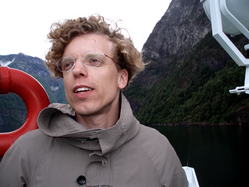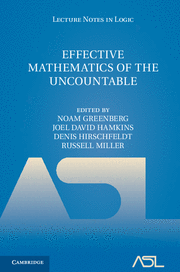Ansten Mørch-Klev earned his M.Sc. degree under my direction at Universiteit van Amsterdam in July, 2007. For his thesis, Ansten undertook to investigate the infinite-time analogue of Kleene’s , the natural extension of Kleene’s concept to the case of infinite time Turing machines. The result was a satisfying and robust theory, which revealed (as predicted by Philip Welch) the central importance of the eventually writable ordinals in the theory of infinite time computability. This work eventually appeared as: Ansten Mørch-Klev, “Infinite time analogues of Kleene’s ,” Archive for Mathematical Logic, 48(7):2009, p. 691-703, DOI:10.1007/s00153-009-0146-2.

Ansten Mørch Klev
web page | DBLP | google scholar
Ansten Mørch-Klev, “Extending Kleene’s O Using Infinite Time Turing Machines, or How With Time She Grew Taller and Fatter”, M.Sc. thesis for Institute of Logic, Language and Computation, Universiteit van Amsterdam, July, 2007. ILLC publication
Abstract. We define two successive extensions of Kleene’s using infinite time Turing machines. The first extension, , is proved to code a tree of height , the supremum of the writable ordinals, while the second extension, , is proved to code a tree of height , the supremum of the eventually writable ordinals. Furthermore, we show that is computably isomorphic to , the lightface halting problem of infinite time Turing machine computability, and that is computably isomorphic to , the set of programs that eventually writes a real. The last of these results implies, by work of Welch, that is computably isomorphic to the theory of , and, by work of Burgess, that is complete with respect to the class of the arithmetically quasi-inductive sets. This leads us to conjecture the existence of a parallel of hyperarithmetic theory at the level of , a theory in which plays the role of , the arithmetically quasi-inductive sets play the role of , and the eventually writable reals play the role of .




